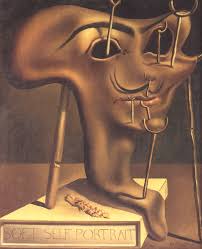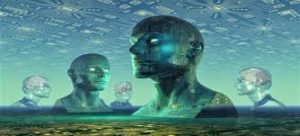First of all, the term “schizophrenia” is of basically little value. Many people tabbed with that label should not be. There are so-called classic cases of schizophrenia — and borderline ones, so-called — but in any case the label is highly misleading and negatively suggestive.
What we are dealing with in many instances are exhibitions of various, sometimes quite diverse personality patterns of behavior — patterns that are, however, not as assimilated, or as smoothly operative as they are in the person we call normal. The patterns are seen in an exaggerated fashion, so that in some such cases at least we can gain glimpses of mental, emotional, and psychic processes that usually remain psychologically invisible beneath the more polished or “finished” social personality of the usual individual.
The person labeled schizophrenic, momentarily or for varying periods of time, lacks a certain kind of psychological veneer. This is not so much a basic lack of psychological finish as it it the adoption of a certain kind of psychological camouflage
Such people — in fashion, now — play a game of quite serious hide-and-seek with themselves and with the world. They believe in the dictum: “Divide and conquer.” It is as if, for reasons I hope to discuss, they refuse to put themselves together properly, refuse to form one fairly united self. The idea behind this is: “If you cannot find me, then I cannot be held accountable for my actions — actions which are bound in one way or another to betray me.”
The self becomes operationally scattered or divided, so that if one portion of it attacked, the other portions can rise up in defense. Such persons use the various elements of the personality as spies or soldiers, scattering their forces, and forced under those conditions to set up elaborate communication systems to keep those portions of the self in contact with each other. In times of stress, they set up an even greater isolation of one part of the self from another, which puts stress upon the system of communication, of course, so that it must be used constantly.
This can have a huge impact on many different areas surrounding their life, including their work. Not being able to function the same way can be difficult, and it could make performing their job harder than someone who doesn’t have schizophrenia would find. As a result, they may need to take a break away from the workplace for a while, as they are finding it increasingly difficult to cope. To help ensure that they still receive a source of income during this time, many may decide to have a look at something like this Disability Insurance to find a plan that best suits their needs. By doing this, they won’t have to worry about losing out on any missed income from their employers, as the insurance will provide this for them. Unfortunately, not being able to communicate in the way they want to can have a harsh impact on their day-to-day life.
The communications themselves are often a kind of psychological or symbolic code, such as might indeed be used in military intelligence. If the messages were to be clearly deciphered and understood, then of course the game would be over, for the one to understand the message would be the united self who had felt the need of such camouflaged self-troops to begin with.
Such a person does feel under siege. often such people are highly creative, with good reserves of energy, but caught between highly contrasting beliefs, either of good and evil, or power and weakness. They are usually extremely idealistic, but for various reasons they do not feel that the abilities of the idealized self can be actualized.
I am making generalizations here, but each individual case should be looked at in its own light. Such people as a rule, however, have an exaggerated version of the self, so idealized that its very existence intimidates, terrified of betraying this sensed inner psychological superior. Usually, such an idealized inner self comes from the acceptance of highly distorted beliefs — again, concerning good and evil. We end up with what can amount to two main inner antagonists: a superior self and a debased self. The qualities considered good are attracted to the superior self as if it were a magnet. The qualities that seem bad are in the same fashion attracted to the debased self. Both of them, relatively isolated psychological polarities, hold about equal sway. All other psychological evidences that are ambiguous, or not clearly understood by either side, group together under their own psychological banners. This is a kind of circular rather than linear arrangement, however, psychologically speaking.
Such people are afraid of their own energy. It becomes assigned on the one hand as a possession of the superior self — in which case it must be used for great adventures, heroic deeds. On the other hand, the person feels unable to use energy in a normal fashion, since in the ordinary world no venture could live up to the superior self’s exaggerated ideals. The person then becomes frightened of pitting himself or herself against the world, or committing himself to ordinary actions, since he feels that in the light of such comparisons he can only debase himself or herself.
He or she requires undue amounts of praise and attention from others, since he or she obviously will get little from himself or herself. In a fashion, to an extent he or she will refuse to be accountable for his or her actions– therefore taking them out of the frame of judgment within which other people must operate. He or she then can avoid putting his or her “talents and superior abilities” to the test, where he or she feels he or she would certainly fail. He or she half realizes that the superior self and the debased self are both or psychological manufacture. His or her abilities are not really that grand. His or her failures are not nearly that disastrous. The belief in these highly contrasting elements of personality keep him or her in a state of turmoil, however, so that he or she feels powerless to act in any concerted fashion.
The term “schizophrenia,” however, covers multitudinous experiences — some such people are quite satisfied with their condition, find their own niches, are able to support themselves, or have means of support. Others live in an atmosphere of constant fear of their own condition, while at the same time they are excited, as soldiers might be in combat. Some can be quite functional in society, and the condition in any case is highly variable, covering people who are simply social misfits to those who are in deep psychological trouble.
With most people, there is a kind of psychological paved road upon which impulses travel before they meet an intersection with the conscious mind, which then determines whether or not the impulse will be followed or acted upon. In the kinds of cases you are discussing, however, instead of a paved road you have a dangerous, rocky field that might be filled with mines ready to explode at any time.
Remember, we are dealing with a scattered force, various elements of the personality sent out to do different tasks — and in a fashion they are caught between the superior self and the debased self. There is, then, no clear line for action to follow. It must also be camouflaged. In stead of clear impulses toward action that intersect directly with consciousness, we have bursts of impulses that emerge as orders to act, coming from another source, or from other sources. These may appear as voices telling an individual to do this or that, as “automatic” commends through writing, or as perceptions that would be called hallucinatory. In this way the individual need not take responsibility for such actions. They do not seem to be coming from himself or herself. The terrible possibility of failure is there to that extent, in that situation, momentarily relieved.
There is always an overall order to the personality, even though it is in the background, so that in any given case all of the separate “selves,” or other sources with whom the individual feels in contact, would together point toward the totality, or unity, that lies beneath. The outstanding mental phenomena, therefore, show in isolated fashions those elements of the personality that are not to be assimilated in the usual smooth fashion.
There are countless instances where “schizophrenic episodes” occur in otherwise normal personalities, where for learning purposes and periods of growth the personality sorts its parts out, and helps them enlarge their frameworks.
The personality can indeed put itself together in multitudinous fashions. There is great leeway in the use of inner and outer perceptions, and the manners in which these are mixed and matched to form an acceptable picture of reality at any given time.
Physical perception gives us a necessary kind of feedback, but it is also based upon learning processes, so that from a young age we learn to put the pieces of the world together in acceptable fashions. In a way, under certain conditions, some schizophrenic situations can give us righter glimpses of inner psychological mobility, a mobility that was focused and directed as we grew through childhood. Schizophrenia represents a kind of learning disability in that particular respect.
I will have more to say in later blogs about such communications, and the ways in which they can point out the greater psychological mobility that is a more or less natural elements in children. when you are child, you are not held accountable for your actions in the same way that adults are, and schizophrenia often begins around puberty, or young adulthood, when people feel that their youthful promise is expected to bear fruit. If they have been considerably gifted, for example, they are now supposed to show the results of schooling through adult accomplishments. If they are nearly convinced, however, that the self is also dangerous or evil, then they become afraid of using their abilities, and indeed become more frightened of the self — which, again, they then try to conquer by dividing. They feel cut off from value fulfillment. In a fashion they begin to act opaquely in the world, showing a divided face.
I will continue the subject in later blogs, tying it more securely to value fulfillment, and stressing the importance of positive action in the physical world, so that ideals can be expressed rather than feared, and so that the doors between impulses and their activations can be left open with some confidence.








































































































